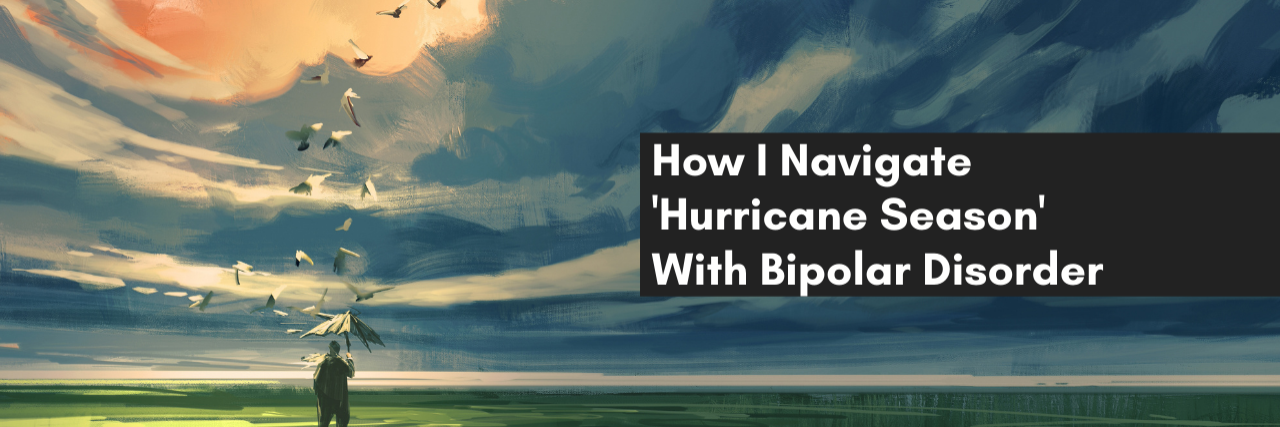It starts with an idea for a project, a smell that conjures a memory or the sensory tug when I see or hear something beautiful. I awaken to a blue sky and birds singing outside my window. A pleasant song plays in my head. My mood barometer seems stable, while hundreds of miles offshore, a tropical storm is forming from the warm water near my equator.
• What is Bipolar disorder?
In the past, I had no early warning system to forecast or predict a hypomanic hurricane’s severity or when it would make landfall. Often I don’t know that I’m having a hypomanic episode until I’m in the eye of the hurricane, or afterward when I am sifting through the wreckage, searching for those to whom I need to apologize.
Mania is hard to talk about because it moves quickly and talks about itself so much. It won’t sit still and shut up. The recognition that this is a hypomanic episode comes with insecurity and doubt. This isn’t a problem. I’ve totally got this, right? leads to What just happened? Was this the real me or the absence of me? Like the story of Dr. Jekyll and Mr. Hyde, I seem to become a stronger, faster and darker version of myself.
Before medication, meditation, a supportive community, and talk therapy, I had no tools. I had no balance. When the hypomanic hurricane made landfall, I tried to ride the storm with cataclysmic results. Once, I saw a French music video with great choreography on Youtube. I watched it 10 times, memorized the French and moved the furniture into the kitchen so I could practice the choreography until after midnight. I called dance studios, ready to shell out $600 to a teacher so I could perform for an audience of friends and family. All of this seemed perfectly normal at the time. The hypomanic episode spanned two weeks until I crashed, wondering what had turned my innocent enjoyment of one song into such an extreme.
I’m not qualified to be a scientist or my own therapist when it comes to bipolar disorder. Instead, I reach out for support, record my daily moods, share them in therapy, look for early signs of hypomania and, based on these “internal weather patterns,” forecast disturbances before a “tropical storm” forms.
Here are some triggers:
- Going home for the holidays
- Meeting someone for the first time, especially if I find them attractive
- Moments of great joy or great sadness
- Feeling lonely, especially at night
- Unexpected, sudden change
- Viewing erotic images online, or graphic violence in the news or movies
- Travel
- Large crowds of people
- Overworking and overscheduling
- Falling in love
- Fear of financial insecurity
- Staying up past my bedtime
Here are symptoms:
- Confidence that today is my day, and nothing can go wrong.
- A surge of irritability that makes me argumentative and impatient.
- Euphoric recall from the past and fantasies about the future.
- Loss of appetite.
- Falling asleep and waking up fully alert a few hours later.
- A feeling of longing that something is missing, and a craving to find it.
- Compulsion to buy things online.
- Obsessive cleaning.
- Experiencing racing and ruminating thoughts.
- Fidgeting, itchy scalp, biting my lip and compulsively stroking my beard.
- Clenching my jaw and difficulty taking in deep, cleansing breaths.
- Becoming emotionally labile, overusing metaphor, puns and inappropriate humor.
- Heightened senses. Noises become louder, the environment becomes brighter, smells are sharper, I crave sugar and caffeine, and I can’t get warm enough.
- Rapid speech and quickly connecting ideas together.
- Singing a song until I get it “just right,” and it’s never just right.
- Feeling like I’m in a movie and others are supporting actors.
- Multitasking, starting grand projects and abandoning them post-episode.
- Smoking cigarettes, hypersexuality, overdrinking and becoming the funniest, most charming man in the room.
How I manage it:
- Help from my therapist, psychiatrist and the bipolar disorder community with documenting the common and less-common symptoms of hypomania.
- Taking a risk and sharing my bipolar disorder with my partner, family and trusted friends. They help me recognize the symptoms when I can’t tell the difference between clear-sky Kevin and hurricane Kevin.
- Pausing and asking, “What’s really going on right now? Where is this going?”
- Delaying big decisions or purchases. I text or call my sponsor and support team. I delay in-person visits with anyone until the storm has passed.
- Making time for creative projects like writing, practicing tai chi or ukulele.
- Calling my psychiatrist and taking the day off work if it feels like a category 5 storm.
- Self-awareness. A moment of genuine laughter isn’t an issue until I need to keep it going.
- I take an over-the-counter sleep aid for insomnia.
- I find humor. There’s a sign on my desk that reads “I hate being bipolar, it’s awesome.” It’s okay to laugh about it sometimes.
Though mania can be both exciting and frightening, it always passes, like hurricanes do. I trust that I’m not alone in the storm. I have support, I’ve got nothing to be ashamed of, and I have tools to help me through a cycle. If I allow myself to feel what I need to feel without acting on impulses, no one, including me, gets hurt. It’s scary when I’m in the eye of the hurricane, but it doesn’t leave behind the trauma and damage it once did.

